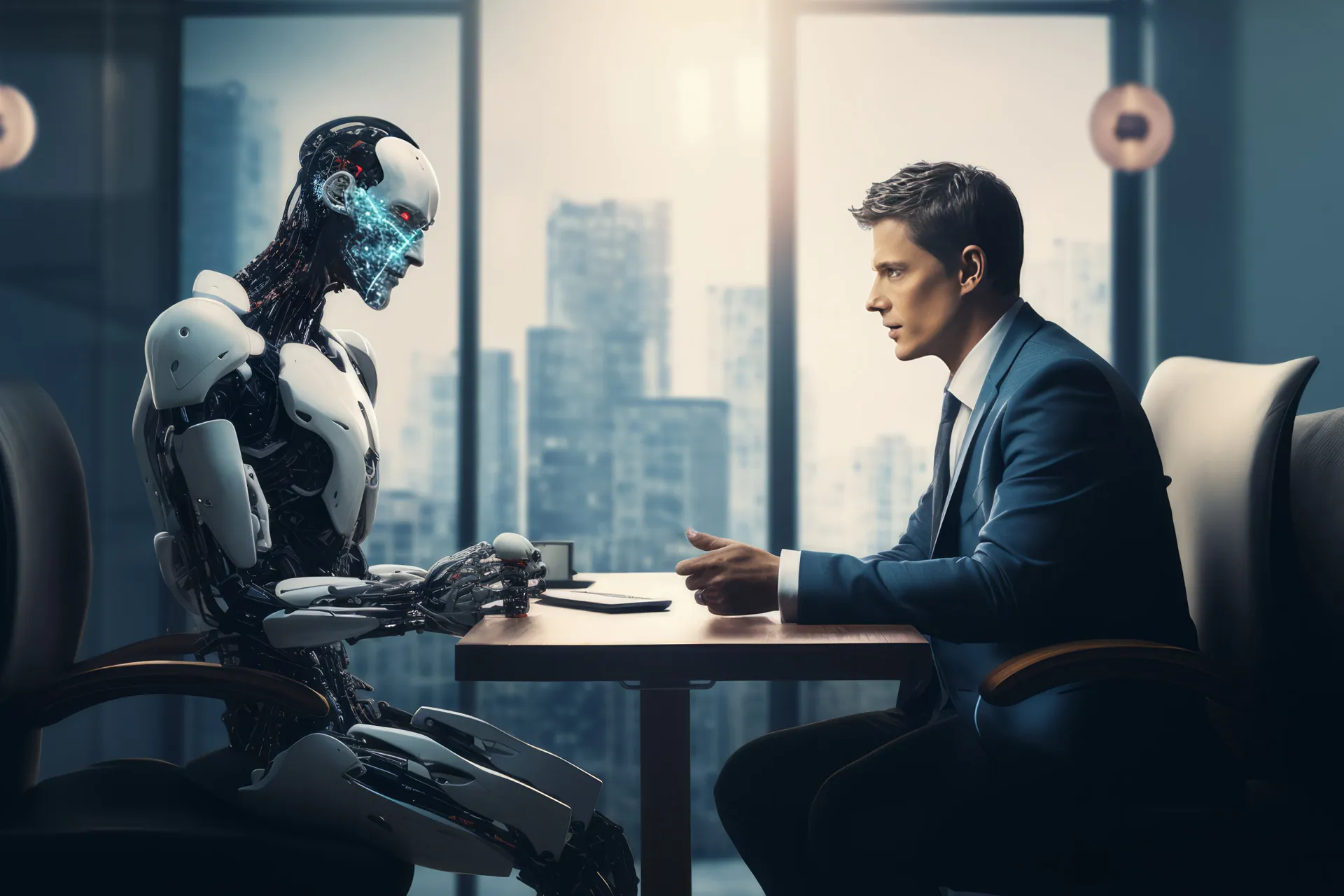In the age of artificial intelligence, we take a fascinating look behind the scenes with Arnold Oberleiter, a renowned expert in AI tools. In our exclusive interview, he shares his insights on the future of AI applications and how they will transform businesses and society. "Adopt or die" - our interview with AI trainer Arnold Oberleiter:
Interview on AI with Arnold Oberleiter
Do you remember when you first came across AI? What was the moment like and what was your first impression?
I first came across AI, as most people know it, in 2018 through Google's experiments in developing an LLM called Bert. I was immediately excited and knew that this was going to change a lot of things. The definition of AI is of course broad and, if you broaden the term enough, even a dishwasher is an "AI". But I think LLMs and diffusion models are currently the hot technologies and they will change a lot.
What are the latest developments in AI tools and how could they change the way companies work?
As I said, LLMs are particularly promising here, and I think LLMs can change everything a company has to do with texts. You can integrate an LLM everywhere, even have emails answered automatically, for example to FAQs. And the combination of all the technologies will be enormous. There is now an AI for just about everything (music creation, text creation, image creation, voice creation and more). This could even go so far that entire Hollywood films could be created with AI in the future. Even now, it is already possible to create some impressive videos that combine music, video, text and spoken word.
What specific benefits do AI tools offer companies and organizations in different industries?
One topic that immediately springs to mind is social media. You can create a lot of content quickly thanks to AI tools, and just about every company can use that. It also enables the comprehensive automation of every conceivable type of text. In concrete terms: creating product descriptions has never been as easy and efficient as it is now with ChatGPT and the matching mockup created by Midjourney.
What is your personal opinion on AI tools?
What my personal opinion is is actually irrelevant. AI is here, and as with any technology, the practical things will prevail and there will come a time when you can't imagine life without AI tools. Just as everyone has a smartphone now, everyone will be working with AI tools in the future, but we don't yet know exactly what they will be. Whether the LLM of choice will really remain ChatGPT is open to speculation. But to answer the question anyway: I find the tools so interesting that I spend a lot of my time learning the tools and teaching others how to use them.
Which AI tools do you use yourself?
I try to test every tool that is available. Currently the following are used a lot: ChatGPT, Cloud 2, Bard, Midjourney, Stable Diffusion and many, many Colab Notebooks. As I said, there are probably 50-60 that I use and test regularly, but these are the things that I use almost daily.
Can you give examples of successful applications of AI tools in practice?
The Xerox company was able to save 50% of spend in one area by integrating AI-Avatar tools and there are many other companies that have achieved similar results. There are also many private social media channels that have been able to grow through AI tools by helping with content creation.
What ethical challenges are associated with the use of AI tools and how do companies deal with them?
The debate will arise as to whether it is ethical to replace humans with machines or AIs (e.g. the bus driver with a vehicle that can drive autonomously). At this point, I would like to raise this question: Would it be ethical to tolerate the risk of human error in transportation when machines are scientifically proven to be 10x safer? AI and machines have always replaced humans; people rarely complain that they are no longer allowed to wash the dishes themselves, or the dishwasher boy in the restaurant. AI will replace many jobs. People will soon accept this and forget about it, just as the dishwasher was forgotten. AI is emotionless and as soon as AI is faster, safer and cheaper, AI will emotionlessly replace humans where it makes sense. That's how progress works. I don't have the right to judge and would like to ask again in conclusion: would it be more ethical to risk human lives and tolerate the risk of human error in certain jobs? Or should we let machines do the things they are better at as soon as they are ready?
What role do AI tools play in the automation of business processes and how do they influence the world of work?
AI can and will automate much more than we can currently imagine; humans live in their own bubble. The role will be so big that it's impossible to imagine at the moment. I think you will be able to get telephone support from an AI in the future, and the support will be better than that of humans. I assume that people would even rather talk to a machine that is polite and can really help with support than to an incompetent employee who would really rather be lying on a beach in Thailand.
How important is the quality and availability of data for the effective use of AI tools?
Data is digital gold. Data is like oil in the industrial revolution. Without data, there are no useful results. Companies that have and collect a lot of data will be the most important companies in the next decade.
What mistakes do beginners make when using AI tools?
- They don't use them.
- Everyone who uses or tries to use AI has already done everything right.
- Besides that, they often forget to give "context". AI tools can only give good answers if you give context and precise instructions.
I believe that when it comes to personalization, humans will be superior for a long time to come.
What skills and qualifications are required to be successful in the development and application of AI tools?
You have to be willing to learn new things, I think that's the be-all and end-all. You also need to be diligent because progress is fast. Things you learn today may not be very useful tomorrow.
How can smaller companies and start-ups benefit from AI tools, and are there affordable options for them?
Many AIs are completely free, you can even run LLMs like Lama locally on your own device and create a chatbot that can answer specific questions from the company.
company can answer. This can be easily automated.
What role do AI tools play in personalized customer targeting and marketing?
In marketing, AI tools are great for attracting attention, that's probably a core principle of marketing, you have to stand out to attract attention. Dazzling videos with stable diffusion can help. AI tools can also be used for personalized appeals, but you have to provide context again. I believe that when it comes to personalization, humans will be superior for a long time to come.
How do AI tools support decision-making at management level and in strategic planning processes?
You can quickly analyze a lot of data and draw logical conclusions from it. When making an important decision, you should rely on data and less on feelings - AIs can't be beaten!
What risks are associated with AI tools?
There is always the risk of answers that are incorrect or have a certain bias. You have to be aware of this and take it into account.
How can the risks of AI tools be minimized?
If you do important things with AI tools, you have to bear in mind, as already mentioned, that the output can be wrong. So you should be an expert in the things you generate with AI tools. You have to be able to assess whether the answers provided by the tools make sense or not. Only then can you assess whether the answer is useful or not.
Are there industries or areas of work in which AI tools will have a particularly transformative impact?
I think almost every industry will be affected. Especially white-collar workers, anything that has to do with data, text, images and creativity. The job of a programmer or data analyst will change a lot, and quite quickly.
How can companies best protect themselves from the transformative effects of AI so that they will still be around tomorrow?
They should learn to use AI tools. If your competition uses AI, and is faster as a result, it can be cheaper. If you can't, and possibly perform even worse, you can guess who will still be in business this time next year. Adapt or die!
Job killer AI: First the editors, then the graphic artists and 3D designers and next the tax advisors, bank consultants and lawyers. What do you think? What is your forecast?
Personally, I would expand the list a bit more, autonomous driving wasn't even mentioned. :) Jobs are generally not being "killed", they are changing. AI will also create new jobs.
What trends do you expect to see over the next few years in terms of the development and use of AI tools?
I expect the trend to continue. AI will be used in all areas where it makes sense. I'm already looking forward to the time when an autonomous Tesla drives me to the beach while my ChatBot handles customer support.
Thank you for the interview!

